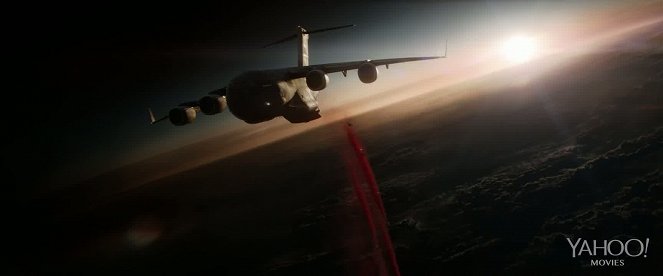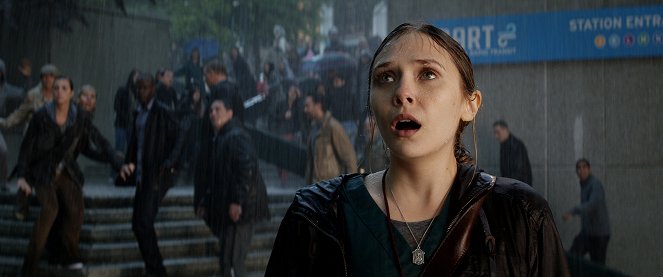Directed by:
Gareth EdwardsCinematography:
Seamus McGarveyComposer:
Alexandre DesplatCast:
Aaron Taylor-Johnson, Bryan Cranston, Elizabeth Olsen, Juliette Binoche, David Strathairn, Ken Watanabe, Al Sapienza, Sally Hawkins, Brian Markinson (more)VOD (5)
Plots(1)
This spectacular adventure pits Godzilla the world's most famous monster, against malevolent creatures that, bolstered by humanity's scientific arrogance, threaten our very existence. (Warner Bros. Home Entertainment)
Videos (23)
Reviews (20)
SPOILERS AHEAD. Godzilla is like playing a video game made up exclusively of cutscenes. The characters are there more or less only so that through their eyes we can marvel at the monsters, which the film tries to obscure much less than in Jurassic Park, for example. The film acknowledges that people are important for it primarily as means of focalisation, so that, for example, we don’t see a fight that was not witnessed by any humans or, at the very least, by a main or supporting character (even though the “earthbound” human perspective here is not maintained as consistently as in Battle Los Angeles). The characters are repeatedly deprived of their agency (the impossibility to rescue one’s wife trapped in the exclusion zone) or it is made explicitly clear that they cannot do much against the monster and they won’t be able to coordinate their actions anyway. The real power belongs to nature and instinct, not to rationally behaving humans (regardless of whether they represent the military or science, or stand apart from established institutions), who are turned into a mere negligible part of an uncontrollable ecosystem (the only time I have felt similar helplessness from an American film was at the end of The Incredible Shrinking Man). People don’t have control over either the present or the future (their plans don’t work out for them); they can only learn from the past, which is an idea that is subordinated to the spiralling dramaturgy of the narrative with clearly indicated parallels between the situation in which Brody senior finds himself at the beginning and the situation in which Brody junior finds himself later. By constantly passivising the human protagonists and the predictability of the one-dimensional characters (the film is built on the most banal gender-based allocation of roles: a woman is a caring nurse, a man is a protective soldier), the Oedipal formula with an absentee father is sidelined in favour of the remarkable transformation of Godzilla, which bears the hallmarks of a villain (indestructibility, terrifying appearance), yet functions as a positive hero in the narrative (because it is the only one that can restore order). Using human characters to causally connect the individual scenes, the plot is developed in such a way that we end up siding with the monster, which is what whole film is about. How else should it be with a monster movie? Before I forget…the film also has brilliant sound effects (after all, using echolocation to track the monsters is one of the motifs of the narrative) and very convincing visual effects (i.e. I believe that a giant lizard could really look and move like that), while also offering breathtaking scenes as if from an art film, impressive only in how they look and how imagery and sound are harmonised within them (the night jump). The bar for other summer blockbusters has been set monstrously high. 85%
()
Godzilla is a movie that sticks to safe clichés, is appropriate for all audiences and is not surprising surprise, but at least it holds together (Pacific Rim was bolder and cooler, but its plot didn’t work). Unlike Roland Emmerich’s version, it also honors the rules of the Japanese cult classic and, with Hollywood’s technical capabilities, allows the Japanese to enjoy their beloved monster as they have never seen it before. Though played by award-winning actors rarely seen in blockbusters, the characters are secondary, as the most important thing here is overall epicness and atmospheric visuals in the spirit of Steven Spielberg’s adventure movies. Spielberg is also referenced in specific scenes, such as the initial helicopter flight to the island and repeated placement of children in every exciting action scene. Watching it today, I feel satisfied; five years ago, I might even have been enthusiastic.
()
Indie directors shouldn’t get into commercial blockbusters, so I wouldn’t look forward to it only to be disappointed. There’s enough action, I believe, but it’s not exciting, which is a far bigger problem than if there was not enough action. The most interesting characters are removed in the first act, and for the remainder of the film, everyone stands staring like a moron, or either think up some bullshit (the bomb here is used in the same weird way as in the last Batman from Nolan) or try to arouse the emotions of the viewer (unsuccessfully). If they had “forgotten” about the story and just let the monsters beat the crap out of each other, it would’ve been better. But they didn’t and the result is painful several times. Visually it’s great, as expected, I would love to print out some frames and hang them on the wall, but when things move it’s really bland. And what pissed me off the most was that the unidimensional protagonist always shows up by chance exactly where the monster is heading. Were the Japanese Godzilla from the past the same? If that is the case, the bullshit has remained bullshit. And I don’t like bullshit.
()
What was promised the most, namely a new look at that notorious destroyer of skyscrapers, ultimately never came. The human factor brings a lot of unnecessary subplots and surprisingly transparent clichés, while the scientific background hides an elusive mass of rapid-fire technical jargon. And it is in vain that Gareth Edwards painstakingly conceals the monster in all its glory, so much so that I was literally exhausted from the eternal waiting and postponement even before the main attractions arrived. Given how high this was aiming, the letdown at the beginning of the closing credits was painfully sobering. The numerous explicitly nerve-racking scenes (the tunnel) thus manage to salvage at least some kind of experience only occasionally.
()
I understand the concept and I see the ambition of the filmmakers, but I can’t help it, the emperor has no clothes. The new American Godzilla is emblematic of our times – a typically exceedingly sophisticated film that’s informed by its roots, which it tries to update and recapture. This time, however, it works only on paper. Yes, we have here an attempt to make an American movie that is more faithful to the Japanese style of kaiju films, but it also embraces the influence of the (from a later perspective, atypical) serious first Godzilla. At the same time, the ambition here is to make a spectacular monster movie, but one in which people will be reduced to tiny creatures who are helpless against nature while also being conceived of as a simple anti-blockbuster in which everything will be conditioned by an ant’s perspective and the viewers will see what the characters themselves see instead of genre money shots. And the reason it doesn’t work is, paradoxically, what they tried to build the film on in the first place: the screenplay and the characters. The secret of the success of the in many ways similar Cloverfield and The Host lies in the consistent adherence to and use of the concept. Cloverfield sticks with the found-footage technique and its characters remain one-dimensional in the interest of giving priority to the monster as a catastrophe that towers over the tiny humans. Conversely, by developing its characters and highlighting the contrast between the commonplace and the monster, as well as the films unpredictable anti-genre nature, The Host manages to express the true nature of the monstrosity towering over the humans with its incomprehensibility. Edwards seems to want to have it both ways, but he doesn’t stick with either. The characters’ perspective and the denial of an ideal point of view become mere quirks when he regularly comes up with compensation in the form of a money shot from a splendid angle. The characters represent a completely absurd manifestation of the attempt to fake a sense of depth. What sense does it make to fill almost all of the major roles with established character actors (with the exception of the protagonist played by a walking pudding) and then give them ridiculously formulaic characters that even the best actor or actress can’t squeeze anything out of? I don’t understand how some reviewers can praise the passivisation of the characters when the film plays by the usual rules. Though it’s true that the most destructive weapons have no effect on the monsters this time, a more essential role is played by the gumption of the central all-American good guy, who not only eliminates all of the embryos of the other monsters, but at the same time also saves Godzilla’s neck in a showdown with the gigantic vermin. Not to mention the way he impeccably reunites strangers and even his own family and survives everything from the long journey home to nuclear explosions unscathed. The result is another contribution to the category of lavishly informed and well-thought-out remakes and adaptations in which experts can show off their ability to discern influences and transformations in comparison with the originals that inspired them. When we take a more detached view, however, all that remains is a burst bubble that may be mesmerising in the cinema with its subtly spectacular nature, but it comes up short at home (even on a big-screen TV). On the other hand, it’s necessary to acknowledge that if one survives the first hour of dysfunctional exposition and then submits to the ridiculous utilitarianism and contrivance of the smallest details, the fiercely serious American Godzilla provides as much of a campy spectacle as the classic, playful adventures of its Japanese inspiration.
()
(less)
(more)



Ads